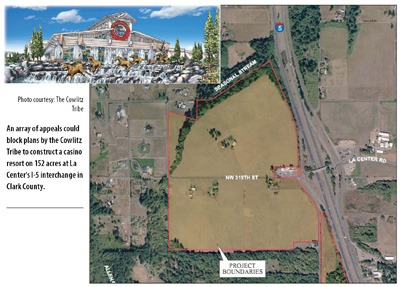Frustration mounts as city and citizen groups tackle local casino issue
 When the U.S. Department of the Interior announced the Cowlitz Indian Tribe could take 152 acres near La Center into trust last month, it appeared the door had been officially opened for the construction of a long-planned resort casino complex.
When the U.S. Department of the Interior announced the Cowlitz Indian Tribe could take 152 acres near La Center into trust last month, it appeared the door had been officially opened for the construction of a long-planned resort casino complex.
Instead, the ruling appears to have opened up a new avenue for future court dates.
Since the Interior’s decision, Clark County has stepped up to the plate as the first organization to appeal the ruling by filing a lawsuit in U.S. District Court in Washington, D.C.
If all goes as expected, they won’t be the last.
The city of Vancouver, a group of La Center card room owners and The Grand Ronde Tribe (operators of Oregon’s Spirit Mountain casino) are likely to challenge the ruling.
The county has said it will center its lawsuit around The Indian Reconciliation Act of 1934 and the U.S. Supreme Court 2009 decision in Carcieri v. Salazar, which said tribes recognized after 1934 can’t take land into trust.
The Cowlitz Tribe was formally recognized in 2000. However, the tribe has gone on record saying the ruling doesn’t apply to them, arguing that the government looked into the issue before giving the okay to turn the La Center land into trust.
But not everyone buys that.
“Essentially, what we have is a U.S. Supreme Court Judge making a decision, and then an executive order flying in the face of the judge. It just baffles the mind,” said Clark County Board Chair Tom Mielke.
Adding to the confusion, Mielke said the Interior’s decision puts the county in a position where it could be out of compliance with Washington’s Growth Management Act (GMA).
The GMA requires local governments to manage growth by protecting critical areas and natural resource lands, preparing comprehensive plans and implementing them through capital investments and development regulations.
“We’re between a rock and a hard place,” said Mielke. “If we go with the Department of Interior’s decision, we’re out of compliance with the state. And then to say Clark County is responsible for the environmental impact? It’s like saying you have all the responsibility and no authority.”
Tom Hunt, part of the group Citizens Against Reservation Shopping (CARS), said he understands the county’s feeling.
“It’s very frustrating,” Hunt explained. “I really don’t know what’s going to happen. It definitely belongs in court because it has to be decided.”
Hunt said the Carcieri Supreme Court ruling is just one of many issues that will need to be worked out before development (casino or otherwise) ever happens.
“There are many other things about how the Cowlitz and their developers have pursued this thing that has left the door open to legal difficulties,” said Hunt.
Looking at how long a potential legal back-and-forth between the opposing sides could last, Mielke said a higher authority should step in.
“I think our governor could give us some direction,” Mielke said. “With a stroke of the pen she could take it completely off of the map.”
For the Vancouver Business Journal’s opinion on the long-planned Cowlitz tribe resort casino, read our OpEd on page 4 of the Vancouver Business Journal.
{jathumbnail off}








